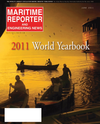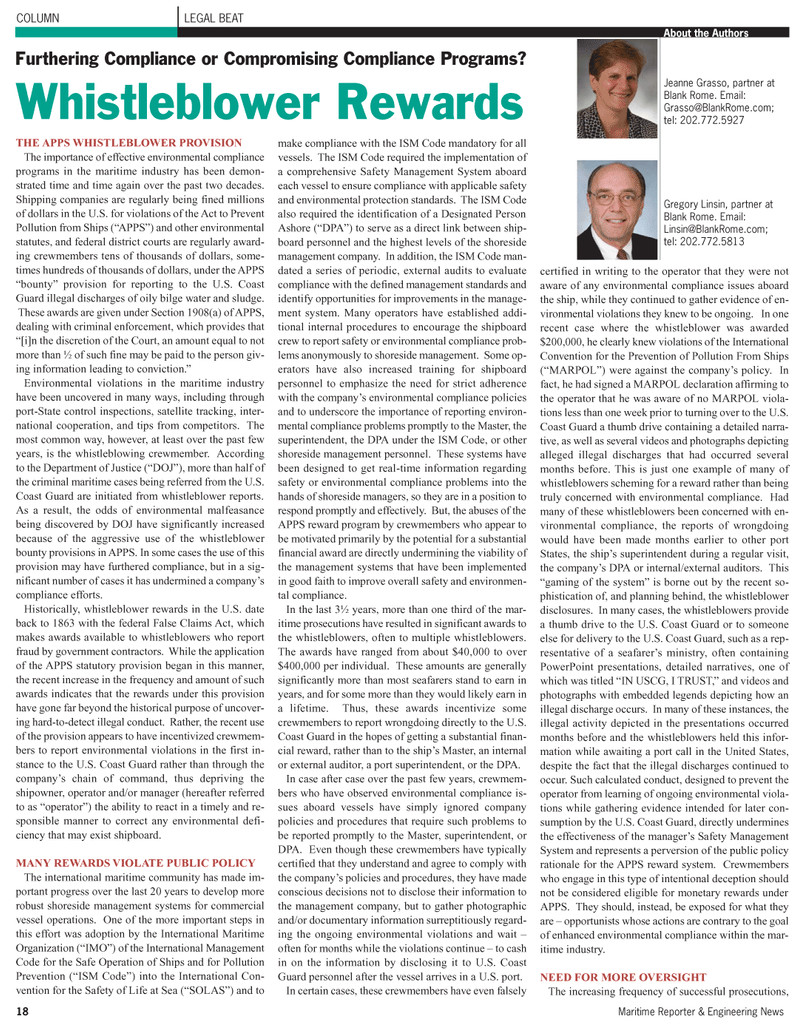
Page 18: of Maritime Reporter Magazine (June 2011)
Feature: Annual World Yearbook
Read this page in Pdf, Flash or Html5 edition of June 2011 Maritime Reporter Magazine
THE APPS WHISTLEBLOWER PROVISION The importance of effective environmental compliance programs in the maritime industry has been demon-strated time and time again over the past two decades. Shipping companies are regularly being fined millions of dollars in the U.S. for violations of the Act to Prevent Pollution from Ships (APPS?) and other environmental statutes, and federal district courts are regularly award- ing crewmembers tens of thousands of dollars, some- times hundreds of thousands of dollars, under the APPS bounty? provision for reporting to the U.S. Coast Guard illegal discharges of oily bilge water and sludge. These awards are given under Section 1908(a) of APPS, dealing with criminal enforcement, which provides that [i]n the discretion of the Court, an amount equal to notmore than ½ of such fine may be paid to the person giv- ing information leading to conviction.? Environmental violations in the maritime industry have been uncovered in many ways, including through port-State control inspections, satellite tracking, inter- national cooperation, and tips from competitors. The most common way, however, at least over the past few years, is the whistleblowing crewmember. According to the Department of Justice (DOJ?), more than half ofthe criminal maritime cases being referred from the U.S.Coast Guard are initiated from whistleblower reports. As a result, the odds of environmental malfeasance being discovered by DOJ have significantly increased because of the aggressive use of the whistleblower bounty provisions in APPS. In some cases the use of this provision may have furthered compliance, but in a sig- nificant number of cases it has undermined a companys compliance efforts. Historically, whistleblower rewards in the U.S. date back to 1863 with the federal False Claims Act, which makes awards available to whistleblowers who report fraud by government contractors. While the application of the APPS statutory provision began in this manner, the recent increase in the frequency and amount of such awards indicates that the rewards under this provision have gone far beyond the historical purpose of uncover- ing hard-to-detect illegal conduct. Rather, the recent use of the provision appears to have incentivized crewmem- bers to report environmental violations in the first in- stance to the U.S. Coast Guard rather than through thecompanys chain of command, thus depriving the shipowner, operator and/or manager (hereafter referred to as operator?) the ability to react in a timely and re-sponsible manner to correct any environmental defi- ciency that may exist shipboard. MANY REWARDS VIOLATE PUBLIC POLICY The international maritime community has made im-portant progress over the last 20 years to develop more robust shoreside management systems for commercial vessel operations. One of the more important steps in this effort was adoption by the International Maritime Organization (IMO?) of the International Management Code for the Safe Operation of Ships and for PollutionPrevention (ISM Code?) into the International Con- vention for the Safety of Life at Sea (SOLAS?) and to make compliance with the ISM Code mandatory for all vessels. The ISM Code required the implementation of a comprehensive Safety Management System aboard each vessel to ensure compliance with applicable safety and environmental protection standards. The ISM Code also required the identification of a Designated Person Ashore (DPA?) to serve as a direct link between ship- board personnel and the highest levels of the shoreside management company. In addition, the ISM Code man- dated a series of periodic, external audits to evaluate compliance with the defined management standards and identify opportunities for improvements in the manage- ment system. Many operators have established addi- tional internal procedures to encourage the shipboardcrew to report safety or environmental compliance prob- lems anonymously to shoreside management. Some op- erators have also increased training for shipboard personnel to emphasize the need for strict adherencewith the companys environmental compliance policies and to underscore the importance of reporting environ- mental compliance problems promptly to the Master, the superintendent, the DPA under the ISM Code, or other shoreside management personnel. These systems have been designed to get real-time information regarding safety or environmental compliance problems into the hands of shoreside managers, so they are in a position to respond promptly and effectively. But, the abuses of the APPS reward program by crewmembers who appear to be motivated primarily by the potential for a substantial financial award are directly undermining the viability of the management systems that have been implemented in good faith to improve overall safety and environmen- tal compliance.In the last 3½ years, more than one third of the mar- itime prosecutions have resulted in significant awards to the whistleblowers, often to multiple whistleblowers. The awards have ranged from about $40,000 to over $400,000 per individual. These amounts are generally significantly more than most seafarers stand to earn in years, and for some more than they would likely earn in a lifetime. Thus, these awards incentivize some crewmembers to report wrongdoing directly to the U.S. Coast Guard in the hopes of getting a substantial finan- cial reward, rather than to the ships Master, an internal or external auditor, a port superintendent, or the DPA. In case after case over the past few years, crewmem- bers who have observed environmental compliance is- sues aboard vessels have simply ignored company policies and procedures that require such problems tobe reported promptly to the Master, superintendent, or DPA. Even though these crewmembers have typically certified that they understand and agree to comply with the companys policies and procedures, they have made conscious decisions not to disclose their information tothe management company, but to gather photographic and/or documentary information surreptitiously regard- ing the ongoing environmental violations and wait ? often for months while the violations continue ? to cashin on the information by disclosing it to U.S. CoastGuard personnel after the vessel arrives in a U.S. port. In certain cases, these crewmembers have even falsely certified in writing to the operator that they were not aware of any environmental compliance issues aboard the ship, while they continued to gather evidence of en- vironmental violations they knew to be ongoing. In one recent case where the whistleblower was awarded $200,000, he clearly knew violations of the International Convention for the Prevention of Pollution From Ships (MARPOL?) were against the companys policy. In fact, he had signed a MARPOL declaration affirming to the operator that he was aware of no MARPOL viola- tions less than one week prior to turning over to the U.S. Coast Guard a thumb drive containing a detailed narra- tive, as well as several videos and photographs depicting alleged illegal discharges that had occurred several months before. This is just one example of many of whistleblowers scheming for a reward rather than being truly concerned with environmental compliance. Had many of these whistleblowers been concerned with en- vironmental compliance, the reports of wrongdoingwould have been made months earlier to other port States, the ships superintendent during a regular visit, the companys DPA or internal/external auditors. This gaming of the system? is borne out by the recent so-phistication of, and planning behind, the whistleblower disclosures. In many cases, the whistleblowers provide a thumb drive to the U.S. Coast Guard or to someone else for delivery to the U.S. Coast Guard, such as a rep- resentative of a seafarers ministry, often containing PowerPoint presentations, detailed narratives, one of which was titled IN USCG, I TRUST,? and videos and photographs with embedded legends depicting how an illegal discharge occurs. In many of these instances, the illegal activity depicted in the presentations occurred months before and the whistleblowers held this infor- mation while awaiting a port call in the United States, despite the fact that the illegal discharges continued to occur. Such calculated conduct, designed to prevent the operator from learning of ongoing environmental viola- tions while gathering evidence intended for later con- sumption by the U.S. Coast Guard, directly undermines the effectiveness of the managers Safety Management System and represents a perversion of the public policy rationale for the APPS reward system. Crewmembers who engage in this type of intentional deception shouldnot be considered eligible for monetary rewards under APPS. They should, instead, be exposed for what they are ? opportunists whose actions are contrary to the goalof enhanced environmental compliance within the mar- itime industry. NEED FOR MORE OVERSIGHT The increasing frequency of successful prosecutions, COLUMNLEGAL BEAT 18Maritime Reporter & Engineering News Furthering Compliance or Compromising Compliance Programs? Whistleblower Rewards About the AuthorsJeanne Grasso, partner at Blank Rome. Email:[email protected];tel: 202.772.5927Gregory Linsin, partner at Blank Rome. Email:[email protected]; tel: 202.772.5813

 17
17

 19
19
